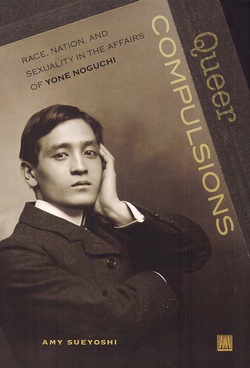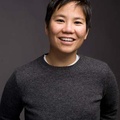Amy Sueyoshi, Associate Dean of the College of Ethnic Studies at San Francisco State University, has just published a book entitled Queer Compulsions: Race, Nation, and Sexuality in the Affairs of Yone Noguchi (Hawai’i, 2012). Queer Compulsions documents the complex love life of Yone Noguchi, a Japanese poet who sojourned in the United States from 1897 to 1904. Yone Noguchi is now mostly remembered as the father of the renowned sculptor, Isamu Noguchi, but he was also an ambitious writer who produced several volumes of poetry (in both English and Japanese), as well as two novelistic diaries: The American Diary of a Japanese Girl (1902) and The American Letters of a Japanese Parlour-Maid (1905).
While living in the United States, Yone Noguchi engaged in numerous romantic affairs with both men and women. In Queer Compulsions , Amy Sueyoshi, focuses upon Noguchi’s romantic correspondence with the poet Charles Warren Stoddard. In addition, Sueyoshi also documents the history of Noguchi’s attachments to two white women: Ethel Armes and Léonie Gilmour.
On January 19, 2013, the Japanese American National Museum will be hosting a special program with the author about Queer Compulsions .
I recently had the chance to interview Amy about her recently published book, her current research, and her thoughts about queer studies and Asian American history. In a geographic homage to Queer Compulsions (which delves into Noguchi’s contact with the “gay Bohemian” culture of turn-of-the century San Francisco), we arranged to meet at a Peet’s Coffee just outside the Castro. It was late in the evening, and Amy came in carrying her blue bike helmet; she had just finished giving a tour in her capacity as a curator for an exhibit at the GLBT History Museum. She kindly offered to buy me a snack, but we eventually settled on responsible non-caffeinated drinks (a box of milk for her, and a peppermint tea for me). We covered a wide range of subjects, with many amusing (and occasionally depressing) anecdotes about Yone Noguchi’s romantic adventures in the United States.
* * *
AL (Andrew Leong): How would you introduce Yone Noguchi to readers who might not be familiar with his life and work?
AS (Amy Sueyoshi): I would say that he was an immigrant, a student-laborer who came to America in hopes of becoming an English-language poet. He was very much connected with the Japanese American community, as were most Issei at the time. But, at the same time, I think he really wanted to “belong” in America. And he had no idea about the kind of racism and Orientalism he would face. I think it came as a shock to him, and he had to carve out ways to deal with it, much like any immigrant who comes to the United States has that moment of “Oh my God! What am I doing?!” Once he arrived, he had to switch gears and adapt very quickly. I have a lot of sympathy and compassion for Yone—poor guy.
AL: It’s interesting that you speak of sympathy and compassion for Noguchi because so much of his behavior was pretty despicable. He lied to his lovers by pretending to be monogamous when he was really pursuing romantic relationships with multiple men and women.
AS: With multiple women, yes…with the men he was a little more honest. It’s funny, I was interviewed by a journalist for a local newspaper and he asked me, “do you think Yone Noguchi was a sex addict ?” And I was like…that is not the point of the book!
AL: Maybe the “compulsions” part of your title, Queer Compulsions, has something to do with the impression that Noguchi was a “sex addict”…?
AS: I know! But it was still a little bit alarming to me. I don’t want people to think that he was a sex addict, for sure. That’s not the point of what I’m doing.
AL: If the “compulsions” part of the title is not so much about sex, then what compulsions did Noguchi have?
AS: I think he was compelled to succeed in America as an English-language poet. He was also compelled in some ways to “sell out,” to capitalize in some way on the fact that he was Japanese. I think Yone was also compelled to grow intimate with Charles Warren Stoddard, or “Charlie,” because his life was so miserable in San Francisco. When you have people spitting on you in the street, and then you get a love letter, it’s going to seem particularly glamorous and fantastic. Charles was living in Washington, DC and I think imagining a distant lover could also have been very compelling to Yone. I also think there was a way in which heterosexual social norms compelled him to get married to a woman. I don’t know if he necessarily loved Matsu Takeda [his Japanese wife] in the same way that he may have loved Ethel, or Leonie, but he certainly loved Charlie. Yone would tell Charlie that he loved him all the time. International relations, the budding love affair between the United States and Japan, also shaped Yone’s actions. So, when I talk about compulsions I don’t want it to seem like an “OCD” kind of compulsion. I’m speaking of compulsions more figuratively, in terms of how society compels you to act in certain ways.
I think for Asian Americans, for folks of color, sometimes we do things that are self-destructive, that aren’t good for us. I don’t think this is necessarily about a lack of self-control so much as about the kinds of pressures that we face. We sometimes are “compelled” to do things that are self-destructive because of intense social and psychological pressures.
AL: Your description of Yone’s intimate relationship with Charlie raises a question of how you think about “queerness” without necessarily turning to “sex” as the first and foremost consideration. In addition to rejecting the idea that Noguchi was a sex addict, there’s also an argument in your book that pushes against the idea that men are all about sex, restoring the idea that there could be such a thing as “romantic friendship” between men, as opposed to that kind of relationship primarily existing between women.
AS: Yes. In early studies of same-sex relationships in the nineteenth century, scholars tended to focus on the personal diaries and letters of women, and court records or public literature about men. As a result, there was this impression that women had “friendships” and “emotional connections” with no sex while men just had sex and orgasms without real emotional connections. I kind of wanted to speak against that tendency, and show how a passionate friendship between two men could be about poetry, letters, and other things besides just sex.
AL: Your emphasis on the romantic friendship between Charlie and Yone has an interesting effect on how you start off the narrative of your book. You begin by setting a beautiful scene of Noguchi climbing up a “hillside bursting with spring flowers.” He’s just received a love letter from Charles Warren Stoddard, and, filled with thoughts of his new love, he gathers poppies and buttercups, throws kisses eastward towards Charles, etc. This is a really interesting place to start, because many other biographies of Noguchi start in a more mechanical way with his birth in Japan, his childhood, or his arrival in the United States. So, why did you choose to start with this poetic moment of romantic expression, this moment of passionate longing for a distant love?
AS: You know, I don’t think it’s that novel to start there, only because in our discipline, we’re kind of trained to start with the most interesting part as a hook. That’s sort of how we roll as historians. I think that Yone’s intimacy with Charlie is central to the argument of the book. So that’s where I started.
My goal was not to tell the life story of Yone. What I wanted to do was talk about Yone’s intimacies and talk about their social, historical significance.
AL: By positioning Yone’s intimacy with Charlie at the core of the book, you seem to be saying, by implication, that his relationships with women—with Leonie Gilmour, Ethel Armes, and Matsu Takeda—were in some way peripheral…that those relationships were not the “main” or “central” relationships in Yone’s life.
AS: I raise a similar question in the book. I ask this question in the conclusion: how do we define “most significant relationship”? Is it about the birth of a baby? Is it about sex? Is it about marriage? Or is it about romantic letters? Based on where you place value, you could say, well, he got engaged to Ethel, so that’s the most important. Or he had a baby with Leonie, so that’s the most important.
I wanted to queer the way we think about relationships. I wanted to fight against assumptions about what “real” love is or supposed to be, the idea that the most “significant” love is measured in terms of engagement, or marriage. So yes, I deliberately focused on Charlie and Yone’s relationship.
I also have a personal investment in things that are queer. I feel like queer folks and queer intimacies have been ignored throughout history. And queer relationships continue to be devalued today. So I wanted to centralize a queer relationship, so we could see it, and then value it.
* * *
BOOKS & CONVERSATIONS
Queer Compulsions: Race, Nation, and Sexuality in the Affairs of Yone Noguchi by Dr. Amy Sueyoshi
Saturday, January 19, 2013 • 2PM
Japanese American National Museum
Los Angeles, California
© 2013 Andrew Way Leong




